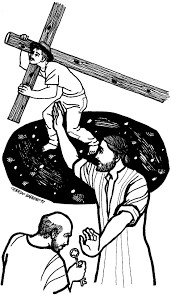Message – Sunday, September 12, 2021
My Brothers and Sisters,
I share with you from the Website: https://www.workingpreacher.org-Mark-8:27-38-3
Jesus’ disciples are undergoing a very intense apprenticeship with Jesus, and it is about to get far more intense as he begins his journey to Jerusalem. Before embarking on this journey south, Jesus pauses to check in with his disciples near the northern city of Caesarea Philippi.
“Who do people say that I am?” he asks (Mark 8:27). This is a relatively easy question. The disciples simply report on the buzz they have heard among the crowds. Some say John the Baptist, others Elijah, and still others, one of the prophets. Jesus’ ministry of preaching, teaching, and healing has indeed born resemblance to that of the great prophets of Israel. The responses are not far off the mark, but they do not quite get to the heart of the matter.
Then Jesus asks his disciples a more pointed question: “And you, who do you say that I am?” Peter, so often the first to speak, responds, “You are the Messiah” (Mark 8:29). Of course, we who know the whole story know that Peter has given the right answer. Yet the answer Peter gives is not actually very logical. The title “Messiah” in Hebrew or “Christ” in Greek was associated in Jewish tradition with an anointed king, a royal figure from the line of David expected to come and free Israel from their Gentile oppressors, purify the people, and restore Israel’s independence and glory.
Nothing in Jesus’ career up to now has given any indication of claims to royalty or political ambitions. So far Jesus has made no claim to be the Messiah, and he certainly has shown no sign of taking on the Romans. Perhaps Peter hopes that when they go to Jerusalem, Jesus will finally take on this messianic role. Perhaps that is why Jesus tells his disciples to tell no one about him, because he knows that they are still so very far from understanding what he is all about.
As soon as Jesus begins to speak of what is to come in his career as Messiah — rejection, suffering, and death — Peter is quick to try to set him straight. He takes Jesus aside and rebukes him. We can imagine him saying, “No, no, Jesus, this is not the way it is supposed to go. The Messiah is supposed to conquer the Romans, not get killed by them. What good is a dead Messiah?”
Peter’s response is understandable in light of Jewish messianic expectations, which are perhaps not so very different from what we want in a Savior. We want someone who is strong and powerful, someone who will rescue us from our troubles and defeat our enemies. Too often in popular evangelism, Jesus is presented in this way — as a kind of superhero who solves every problem for us, as a guarantor of prosperity and success. Nothing could be further from what Jesus has in mind.
Jesus’ response to Peter is harsh: “Get behind me, Satan! For you are setting your mind not on divine things but on human things” (Mark 8:33). This is one of those moments in Scripture that highlights the vast distance between us and God. Though Jesus is God with us, we cannot tame him or make him over into our image. We would like a savior who is a winner, and one who makes us winners, but Jesus insists on identifying with the lowliest of losers. He will allow himself to be judged and condemned as a blasphemer by Jewish religious leaders. He will allow himself to be mocked, tortured, and executed as a criminal by the Romans.
And that’s not all. Jesus actually expects his disciples to follow him on this path of suffering and death. “If any want to become my followers, let them deny themselves and take up their cross and follow me. For those who want to save their life will lose it, and those who lose their life for my sake, and for the sake of the gospel, will save it” (Mark 8:34-35).
Here I think it is important to be clear about what Jesus means by taking up the cross. He is not talking about the suffering that is simply part of life in a broken world — everything from annoying neighbors to serious illness to natural disasters. Neither is he telling us to seek out suffering or martyrdom. Jesus himself did not seek it, but he foresaw that it would be the inevitable outcome of his mission.
Jesus speaks of losing our lives for his sake, and for the sake of the gospel. Taking up our cross means being willing to suffer the consequences of following Jesus faithfully, whatever those consequences might be. It means putting Jesus’ priorities and purposes ahead of our own comfort or security. It means being willing to lose our lives by spending them for others — using our time, resources, gifts, and energy so that others might experience God’s love made known in Jesus Christ.

